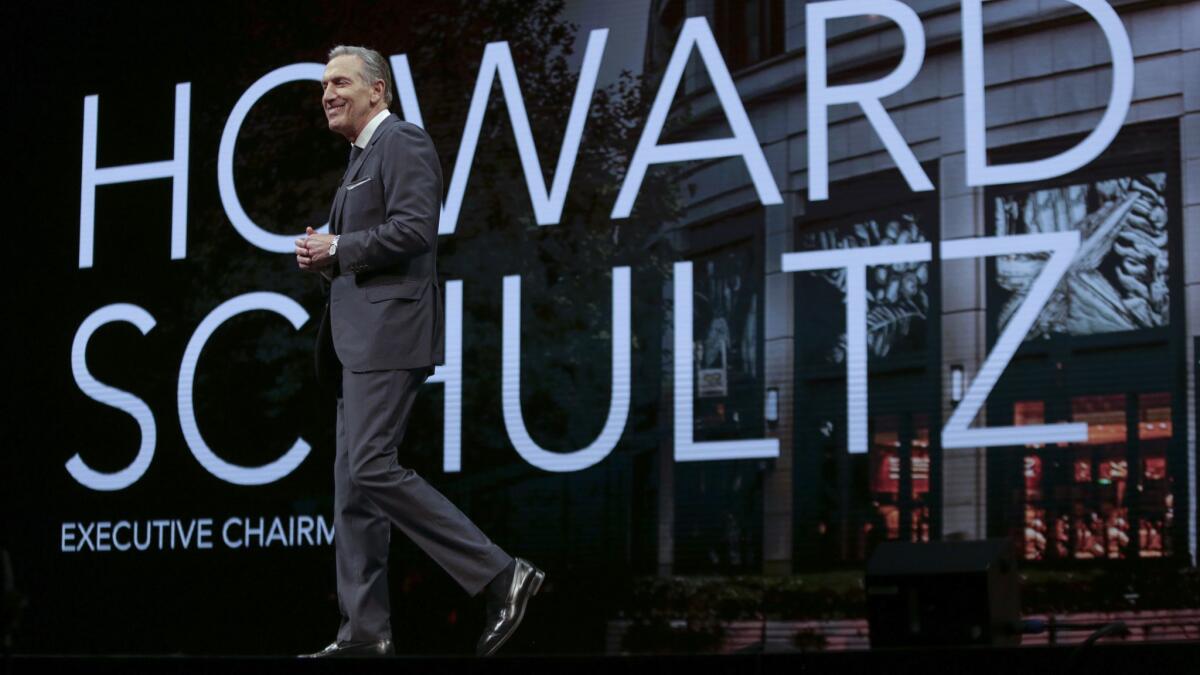Starbucks guru is said to be considering a run for the White House. That might be a hard sell in Seattle

- Share via
Reporting from SEATTLE — Late in the morning in the Seattle neighborhood of Georgetown, James Harper is fetching lunch from a Mexican restaurant called Lorena’s Kitchen. An aircraft bound for Boeing Field obscures the gleaming sun, flying so low that it feels as though it might land in Harper’s salsa.
Harper stops to contemplate whether he could throw his support behind a potential run for the White House by Howard Schultz, owner of Starbucks, a Seattle institution. But Schultz also is the former owner of the Seattle SuperSonics, and for many Seattle residents that’s a problem, at least when it comes to giving him their vote.
“I’m a Sonics fan, so it just won’t happen,” Harper concludes.
Across the Duwamish River in the neighborhood of South Park, a middle-aged man with a formidable beard nurses a beer at Loretta’s, a bar and eatery. He echoes Harper, albeit more bluntly and with a two-word phrase unprintable here.
In 2006, Schultz sold the Sonics to an ownership group led by Oklahoma City energy baron Clay Bennett. At the time, Schultz said he was frustrated by local politicians’ refusal to fork over millions of dollars in public money for arena improvements. Soon after the sale, Bennett moved the NBA team to the Sooner State and rechristened them the Thunder. Schultz completed this transaction 12 years ago, but in Seattle, where bitter Sonics fans still abound, it might as well have been yesterday.
How a Schultz presidential candidacy, presumably taking flight with a bid for the Democratic nomination, would play nationally is an open question. He recently hired John McCain’s former right-hand man, Steve Schmidt, as an advisor, which isn’t a move someone makes unless he has a major office in his sights.
But his bungled stewardship of what was, at the time, the only major men’s professional sports franchise in Seattle to have won a league championship in the modern era, hangs like an albatross around the New York native’s neck in his adopted hometown (the Seahawks have since won the Super Bowl and, if not for the worst goal-line call in NFL history, would have won one more).
“There’s still a hangover from the Sonics,” says Seattle-based public affairs consultant Ron Dotzauer. “He promised us the team would stay in Seattle, and he lied. I don’t think he could finish in the top three in a mayor’s race in Seattle.”
“He sold Seattle down the river, knowing full well what Bennett was going to do,” adds Dotzauer, refusing to believe Schultz’s claim that he thought Bennett would try to keep the team in Seattle. (Schultz, through a spokesperson, declined to be interviewed for this story.)
And Schultz’s challenges with Seattle voters don’t end with the Sonics.
“I don’t think that he has enough chops in terms of advocacy and work on the ground,” says Karen Besserman, executive director of Emerge Washington, an organization that recruits and trains Democratic women to run for office. “He’d be a fresh face because he’s outside the political norm, but I think Seattle as a city understands the need for experience. Starbucks is a mixed blessing: People either love it or hate it.”
Indeed. Think of the famous “Onion” headline: “New Starbucks Opens In Rest Room Of Existing Starbucks.” That made it into print 20 years ago. It’s a testament to the ubiquity of a café culture that’s only gotten more ubiquitous in the time since.
Besserman says Schultz hasn’t been a major force in local politics. “He hasn’t shown up as an active player in the Democratic Party or policy fights that haven’t directly affected him,” she says.
“More generally, Seattle is a very strongly progressive city that includes a significant amount of people on the left who are suspicious of business,” says political consultant Sandeep Kaushik. “I think any billionaire businessman would have a tough time in Seattle.” (As of Dec. 28, Schultz ranked 280th on the Forbes 400, with a net worth of $3.2 billion.)
To that end, spotting Schultz at a public event in Seattle is like a true-life version of “Where’s Waldo?” He often crops up in other cities laying the groundwork for his next professional chapter, or is presumably ensconced in his stately residence in Madison Park, which is among the nicest areas in Seattle — along with Denny-Blaine. The Schultz family left the latter neighborhood after a private driveway they built through a public park didn’t go over too well with their neighbors.
The office housing Jason Reid’s and Adam Brown’s film production companies sits hard by a set of railroad tracks in SoDo, a heavily industrial neighborhood south of downtown Seattle. Starbucks’ world headquarters are located a mere half-mile to the northwest, a fact that takes on a darkly comic texture once you learn of the pair’s opinion of Schultz.
“He back-stabbed the city of Seattle,” says Reid, who, with Brown among his collaborators, produced a feature-length documentary, “Sonicsgate,” about the team’s departure. “He could have shown a little patience and waited for the Steve Ballmers of the world [to bid for the team].” (Ballmer, a former Microsoft chief executive, bought the Los Angeles Clippers in 2014.)
“It was really just a tantrum,” Brown says of Schultz’s decision to sell the team to the group from Oklahoma City, a metropolis that had been openly pining for an NBA franchise after temporarily hosting New Orleans’ team in the aftermath of Hurricane Katrina. “The state Legislature wouldn’t kiss the ring, and Schultz likes being the king. His ego didn’t want another local businessman to succeed where he’d failed.”
Brown goes so far as to call Schultz “the Democratic version of [President] Trump,” listing having a “cult following” and being “ego-driven” among their supposed shared qualities. There are similarities, to be sure: Both men were raised in New York City (Trump in an affluent Queens neighborhood, Schultz in public housing in Brooklyn), both are polarizing figures in the cities they now call home, both are wealthy businessmen, and should Schultz choose to run, he would have exactly the same amount of experience in public office as Trump had when he successfully ran: zero.
But Kaushik thinks it’s unfair to compare the two, noting, “Schultz, in his life and work, has shown a genuine belief in the importance of public service and the responsibilities that come with it in a way that Donald Trump absolutely has not. Whether it’s trying to foster dialogues around race or engaging with other significant civic issues, I think Howard Schultz has demonstrated a seriousness of purpose and good intent.”
As with Starbucks’ ham-handed #RaceTogether campaign, where the company was roundly mocked for encouraging customers to have discussions with baristas about racial relations while their java percolated, Schultz’s good intentions occasionally misfire. Yet in contrast to the discomfort he exhibits when asked to discuss the Sonics debacle, he’s refreshingly self-critical when reflecting on his strategic missteps outside the sporting realm. He also boasts a rags-to-riches background that about any candidate would love to share.
While several of the people who shared their opinions on Schultz considered both his lack of political experience and role in the Sonics’ debacle to be problematic, some weren’t bothered one bit. Dressed in hospital scrubs as she unlocked her car door after picking something up in Georgetown, Meghan Moore said she’d be open to supporting Schultz over other Democratic presidential contenders because “he’s a successful businessman.” And back at Loretta’s, a third-grade teacher named Dave Darling said he’d vote for Schultz based on how he’s dealt “with social justice issues.”
Darling, who has a series of beads braided into his goatee, now feels his decision to vote for Trump in 2016 “was wrong,” and singles out Schultz’s response to one of Starbucks’ biggest blunders: When a store manager in Philadelphia called the cops on two black men who were waiting for a friend earlier this year, Schultz closed the company’s U.S. locations for several hours so employees could undergo diversity training.
“I think he’d be able to collaborate rather than build a wall between Democrats and Republicans,” Darling says. “That’s a big selling point for me.”
But what about the Sonics? That may not be an issue in, say, New Hampshire or Iowa, but the team’s departure remains a sore spot here. “Seattle isn’t going to forgive or forget,” says Dotzauer, the public affairs consultant. “He’s going to carry this to his grave.”
Seely is a special correspondent.
More to Read
Sign up for Essential California
The most important California stories and recommendations in your inbox every morning.
You may occasionally receive promotional content from the Los Angeles Times.










